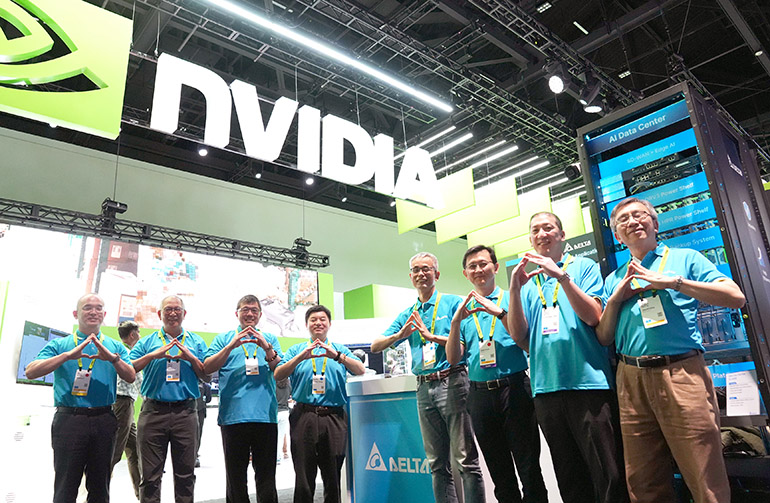|
Listen to this article |

Delta exhibited its data center and other technologies at NVIDIA GTC 2024. Source: Delta Electronics
SAN JOSE, Calif. — Artificial intelligence and robotics both devour power, but simulation, next-generation processors, and good product design can mitigate the draw. At NVIDIA Corp.’s GTC event last week, Delta Electronics Inc. demonstrated how its digital twin platform, developed on NVIDIA Omniverse, can help enhance smart manufacturing capabilities.
“We’ve partnered with NVIDIA on energy-efficient designs to support AI,” Franziskus Gehle, general manager of the Power Solutions business unit at Delta, told The Robot Report. “We’ve co-developed 5.5 kW designs for 98% efficiency.”
The Taipei, Taiwan-based company explained how its technologies can benefit industrial automation and warehouse operations. Delta also showed its ORV3 AI server infrastructure product and DC converters and other technologies designed to support graphics processing unit (GPU) operations.
 Learn from Agility Robotics, Amazon, Disney, Teradyne and many more.
Learn from Agility Robotics, Amazon, Disney, Teradyne and many more.
Delta designs simulation to manage automation
Founded in 1971, Delta Electronics said it is a global leader in switching power supplies and thermal management products. The company’s portfolio includes systems for industrial automation, building automation, telecommunications power, data center infrastructure, electric vehicle charging, renewable energy, and energy storage and display.
Delta added that its energy-efficient products can support sustainable development. The company has sales offices, research and development centers, and factories at nearly 200 locations around the world. It provides articulated robot arms, SCARA robots, and robot controllers with integrated servo drives.
“Since 1995, Delta has supplied automation components, and it now offers a full product line,” said Claire Ou, senior principal for strategic marketing in the Power and System business group at Delta. “We’ve used NVIDIA simulation for our customers and ourselves, for machine tools and semiconductors.”
“Because Delta has a lot of factories around the world, it’s best to do test runs to fine-tune our hardware and software before implementation,” she told The Robot Report. “Our solutions can monitor and manage warehouses and factories for maximum productivity.”
In addition, Delta has developed its own standalone simulation software in addition to NVIDIA Omniverse, and it can integrate data from both. In the past, automation designers, manufacturers, and users worked with different tools, but customers are now optimistic about easier collaboration, said Ou.
“In 2012, Industry 4.0 was about digitalizing manufacturing,” she noted. “Since then, our management and monitoring systems have been integrated into global factories. We’re also working with data for construction and smart buildings.”
NVIDIA partners for digital twins to manage power
“We are honored to be the only power and thermal management solutions provider at NVIDIA GTC 2024, where we will showcase the NVIDIA Omniverse-powered digital twin we have developed, which underscores our superior expertise in next-generation electronics manufacturing,” stated Mark Ko, vice chairman of Delta Electronics. “We look forward to helping transcend the boundaries of energy efficiency in the AI realm using the latest technologies.”
Delta has deployed its power management technology to leading cloud solution providers (CSPs) and AI developers such as Meta (parent of Facebook), Microsoft, and Amazon Web Services, noted Gehle.
“Our customers have doubled their power requirements in the past six months rather than in years,” he said. “All of their road maps anticipate a significant increase in power demand, so they need management in place for next-generation GPUs and power-hungry generative AI.”
“We used digital twins and Omniverse to design and pre-qualify our products worldwide,” Gehle explained. “It’s important that our data center plans are aligned with those of our customers.”
At GTC, Delta presented an integrated Open Rack Version 3 (ORV3) system for AI server infrastructure with server power supplies boasting energy efficiency as high as 97.5%. It also included SD-WAN, Common Redundant Power Supply Units (CRPS) with 54Vdc output, ORV3 18kW/33kW HPR Power Shelves, a Battery Backup Unit (BBU), a Mini UPS, and a liquid cooling system.
In addition, the company showed its portfolio of DC/DC converters, power chokes, and 3D Vapor Chambers for GPU operations.
“The new era of AI-powered manufacturing is marked by digital twins and synthetic data, which can enhance efficiency and productivity before actual production begins,” said Rev Lebaredian, vice president of Omniverse and simulation technology at NVIDIA, in a release.
“By developing its digital platform on NVIDIA Omniverse, Delta can virtually link specific production lines and aggregate data from a diverse range of equipment and systems to create a digital twin of its operations,” he said. “And with NVIDIA Isaac Sim, it can generate synthetic data to train its computer models to achieve 90% accuracy.”
